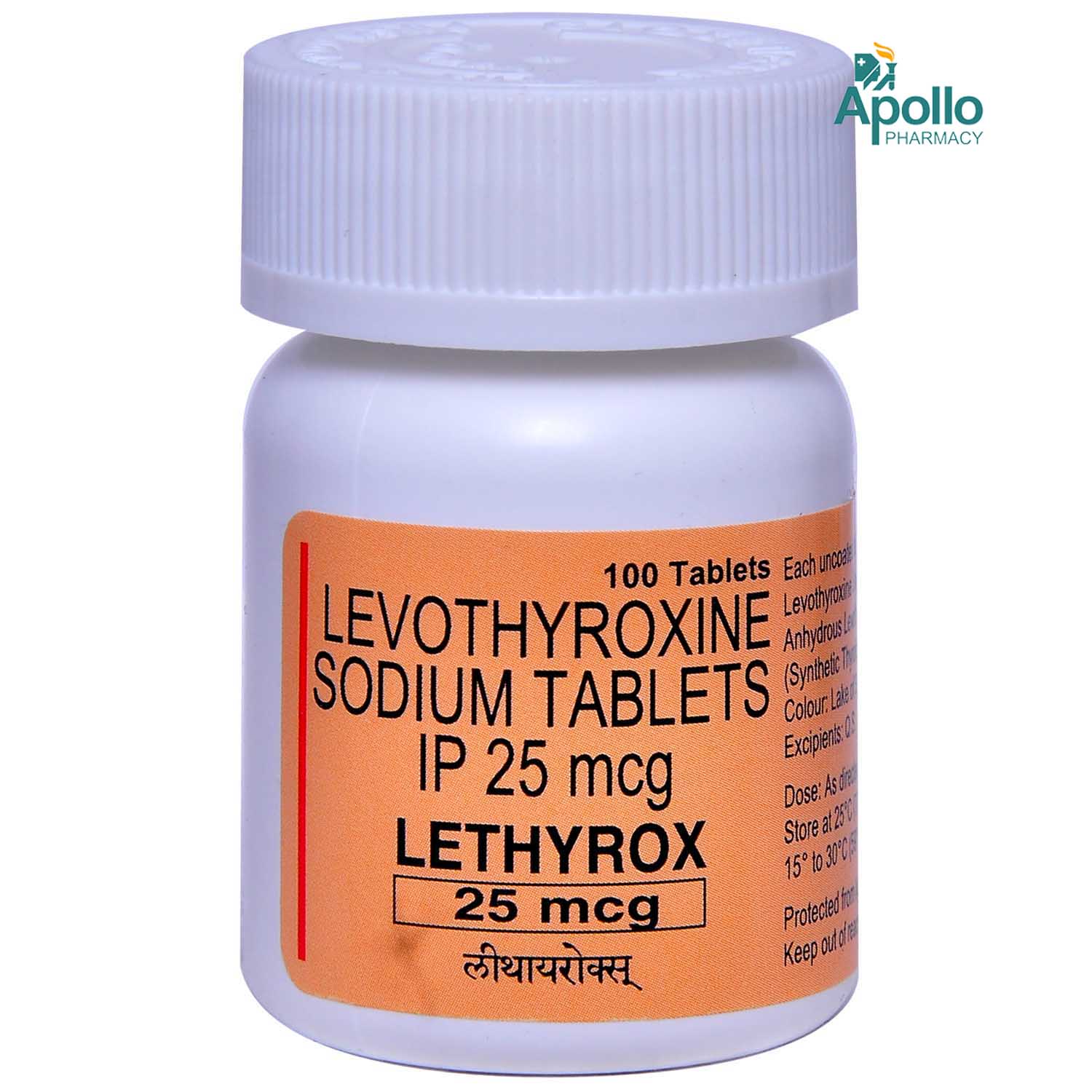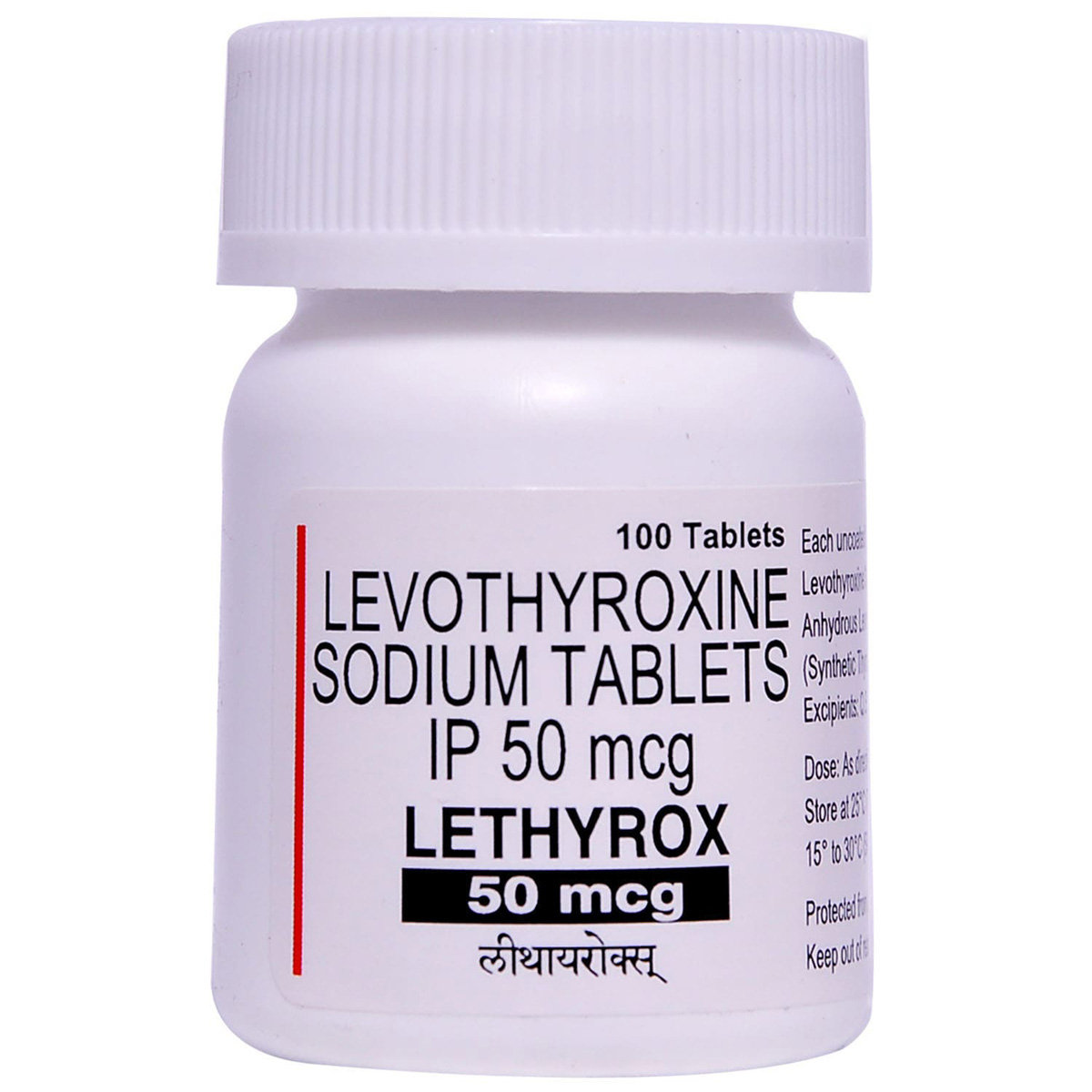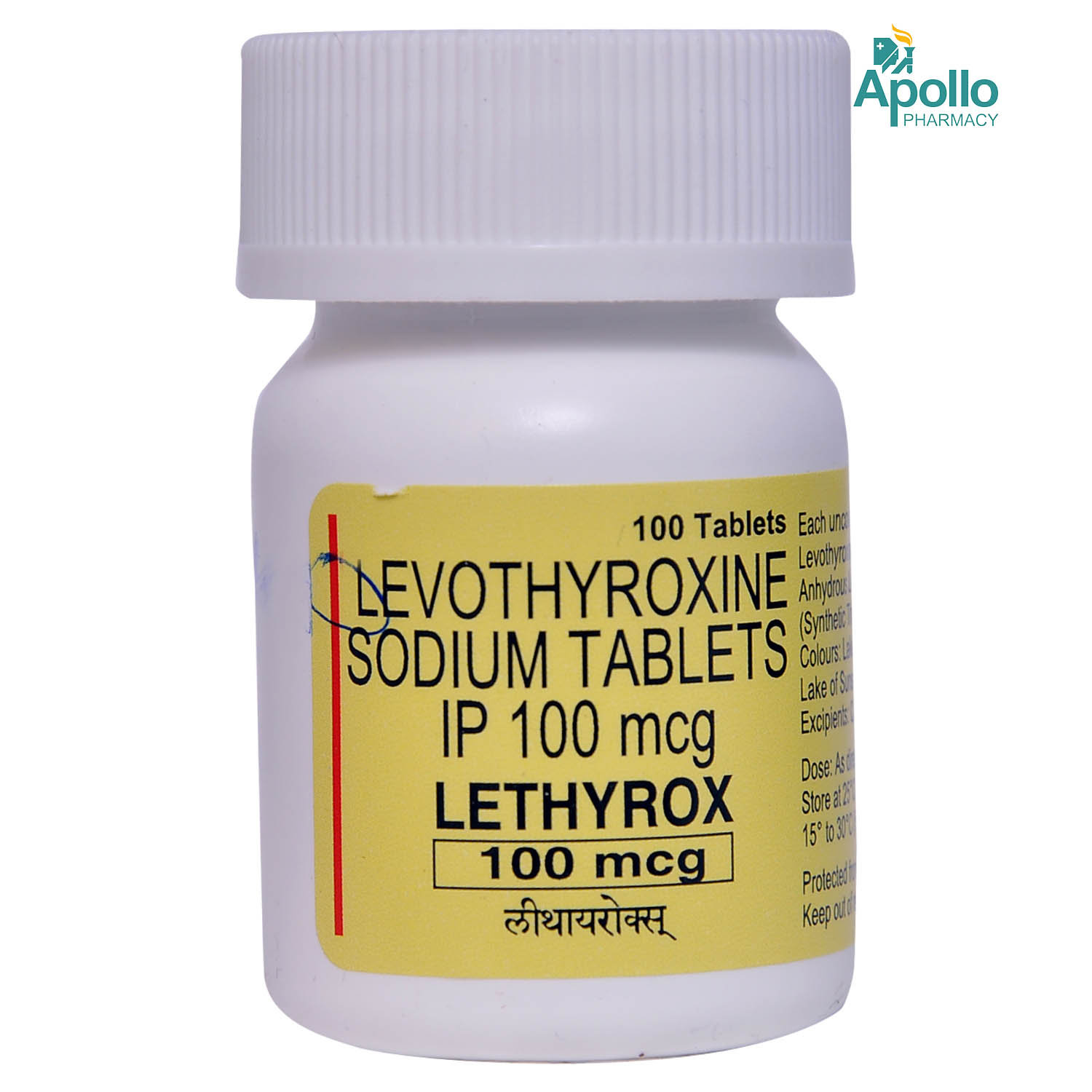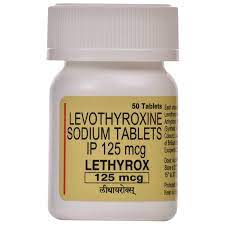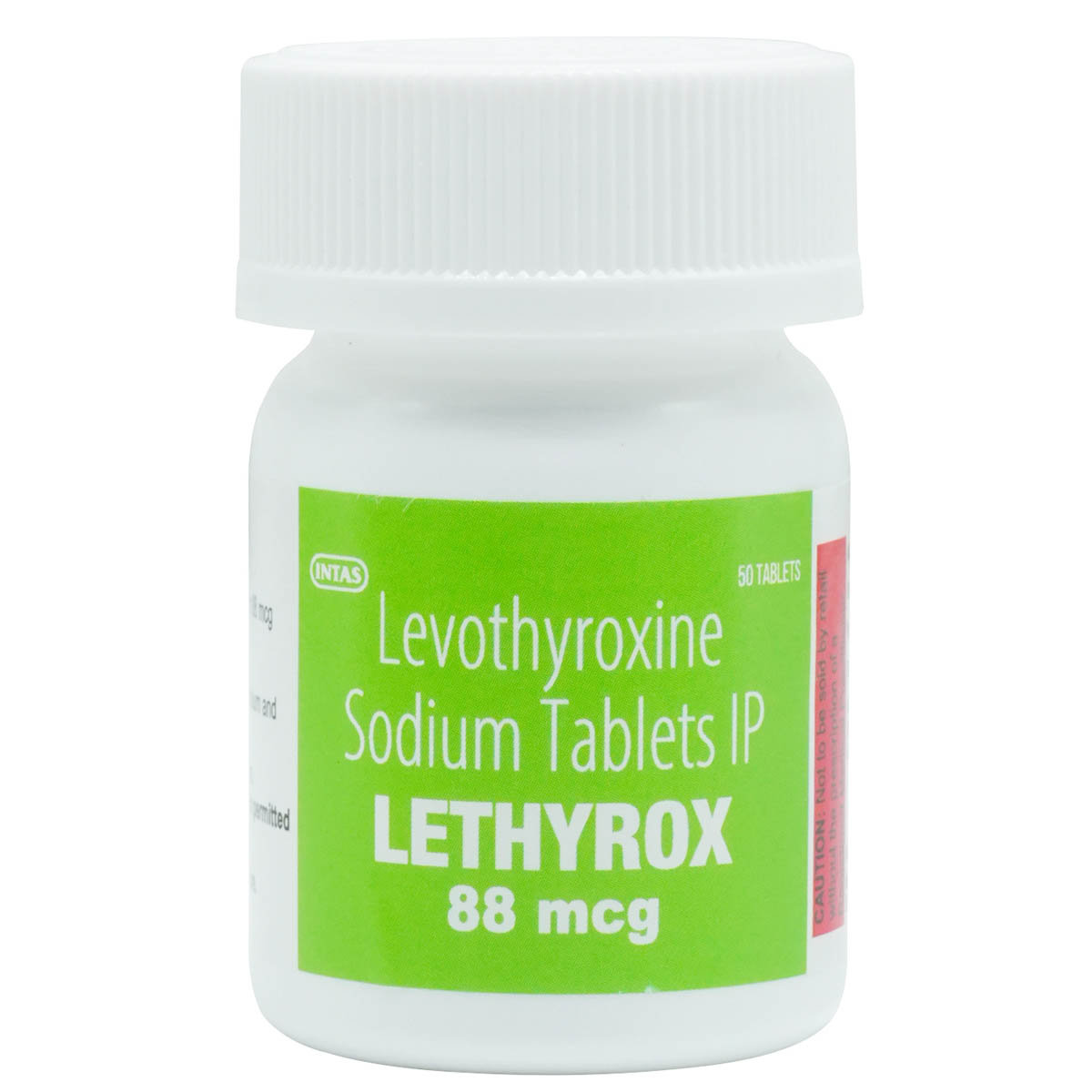Levothyroxine
About Levothyroxine
Levothyroxine belongs to a class of drugs called synthetic thyroid hormones used to treat hypothyroidism (underactive thyroid gland). Hypothyroidism is a chronic condition in which the thyroid gland (located below the throat in the neck) cannot produce enough thyroid hormone.
Levothyroxine contains Levothyroxine that replaces thyroxine (a thyroid hormone) naturally produced by the thyroid gland. Thus, it restores the levels of thyroid hormones.
Take Levothyroxine as prescribed by your doctor. You are advised to take Levothyroxine for as long as your doctor has prescribed it for you based on your medical condition. In some cases, you may experience vomiting, headache, diarrhea, restlessness, weight loss, irregular or fast heartbeat, restlessness, muscle weakness, or excitability. Most of these side effects of Levothyroxine do not require medical attention and gradually resolve over time. However, if the side effects persist or worsen, please consult your doctor.
If you are allergic to Levothyroxine or any other anti-thyroid medicines, please tell your doctor. Usually, the liquid form is recommended for young children. If you are pregnant or breastfeeding, please consult a doctor. If you are about to undergo any surgery, inform your doctor that you are taking Levothyroxine. If you have symptoms of a heart attack such as sweating, chest pain or heavy feeling, nausea, general ill feeling, or pain spreading to the shoulder or jaw, do not take Levothyroxine and consult a doctor.
Uses of Levothyroxine
Medicinal Benefits
Levothyroxine contains Levothyroxine, a synthetic thyroid hormone that works by replacing thyroxine (a thyroid hormone) naturally produced by the thyroid gland. Thus, it restores the levels of thyroid hormones.
Directions for Use
- It should be taken on an empty stomach, 30 minutes to 1 hour before breakfast, as advised by the doctor.
- Follow your doctor's instructions on the dosage and timing of this medication to ensure safety.
- Swallow Levothyroxine as a whole with a glass of water.
- Do not chew, crush or break it.
Storage
Side Effects of Levothyroxine
- Vomiting
- Headache
- Diarrhea
- Restlessness
- Weight loss
- Irregular or fast heartbeat
- Restlessness
- Muscle weakness
- Excitability
Drug Warnings
If you are allergic to Levothyroxine or any other anti-thyroid medicines, please tell your doctor. Usually, the liquid form is recommended for young children. If you are pregnant or breastfeeding, please consult a doctor. If you are about to undergo any surgery, inform your doctor that you are taking Levothyroxine. Levothyroxine is not recommended to treat obesity or weight problems. If you have symptoms of a heart attack such as sweating, chest pain or heavy feeling, nausea, general ill feeling, pain spreading to the shoulder or jaw, do not take Levothyroxine and consult a doctor. If you have recently received radiation therapy with iodine such as I-131, inform your doctor before taking Levothyroxine.
Drug Interactions
Drug-Drug Interaction: Levothyroxine may interact with anti-diabetic drug (metformin), calcium, antidepressants (amitriptyline, imipramine, dosulepin), beta-blockers (propranolol, atenolol, and sotalol), anticonvulsants (carbamazepine, primidone, phenytoin), antibiotic (rifampicin).
Drug-Food Interaction: The absorption of Levothyroxine may be decreased by foods like soybean flour, cottonseed meal, walnuts, dietary fiber, iron, calcium, and calcium-fortified juices. So, try to avoid these foods if possible.
Drug-Disease Interaction: If you have thyrotoxicosis, diabetes, high blood pressure, chest pain (angina), or coronary artery disease, inform your doctor before taking Levothyroxine.
Drug-Drug Interactions Checker List:
Safety Advice

Alcohol
consult your doctorThe interaction of Levothyroxine with alcohol is unknown. Please consult a doctor before consuming alcohol while using Levothyroxine.

Pregnancy
consult your doctorPlease consult a doctor if you are pregnant. Levothyroxine is given to pregnant women if the doctor thinks the benefits outweigh the risks.

Breast Feeding
consult your doctorPlease consult a doctor if you are breastfeeding. Your doctor may adjust the dose appropriately if you are breastfeeding.

Driving
safe if prescribedLevothyroxine usually does not affect your ability to drive or operate machinery.

Liver
consult your doctorIf you have any concerns regarding the use of Levothyroxine in patients with Liver problems, please consult a doctor.

Kidney
consult your doctorIf you have any concerns regarding using Levothyroxine in patients with kidney problems, please consult a doctor.

Children
cautionYour doctor may adjust the dose according to your child's age, weight and other pre-existing conditions. Levothyroxine should be used for children as advised by the doctor.
Habit Forming
Diet & Lifestyle Advise
- Iodine, zinc, and selenium are beneficial for people with hypothyroidism. However, it’s best to avoid iodine and selenium supplements unless your doctor advises you to take them.
- Hypothyroidism usually involves a loss of calcium (hypocalcemia) and Vitamin D in the body. In such a case, people with hypothyroidism should opt for calcium-enriched foods.
- Eat more protein as it may help boost your metabolism as people with hypothyroidism usually have a slower metabolism.
- Do regular yoga and aerobics exercises to boost the metabolism.
- Eat more vegetables, fruits, and lean meats. These foods are low in calories and may help prevent weight gain.
- Avoid taking Goitrogens (agents that interfere with the thyroid gland's normal function), which generally includes soy foods (tofu), cabbage, broccoli, kale, cauliflower, spinach, sweet potatoes, cassava, peaches, strawberries, millet, pine nuts, peanuts, etc.
Special Advise
Regular blood tests are recommended while taking Levothyroxine to monitor the effect of Levothyroxine.
Patients Concern
Disease/Condition Glossary
Hypothyroidism: It is also known as underactive thyroid, a chronic condition when the thyroid gland does not make enough thyroid hormones to meet your body’s needs. When there is a low level of thyroid hormones, our body’s functions and metabolism slow down. Symptoms of hypothyroidism include tiredness, increased sensitivity to cold, constipation, dry skin, unexplained weight gain, puffy face, hoarseness of voice, and muscle weakness. There may be a loss of Calcium and Vitamin D in some cases of hypothyroidism.
FAQs
Levothyroxine is used to treat hypothyroidism (underactive thyroid gland).
Levothyroxine contains Levothyroxine that works by replacing thyroxine (a thyroid hormone) naturally produced by the thyroid gland. Thus, it restores the levels of thyroid hormones.
Levothyroxine should be used with caution in diabetic patients as it may increase blood sugar levels. Therefore, inform your doctor if you have diabetes so that the dose may be adjusted appropriately.
Hair loss may occur during the first few months of treatment in children. This effect is usually temporary, and hair regrows. If this effect persists or worsens, tell your doctor for further treatment.
You are not recommended to take Levothyroxine with phenytoin (anticonvulsant) as it may reduce the effectiveness of Levothyroxine. However, please consult a doctor before taking Levothyroxine with other medicines.
Levothyroxine may cause thyroid crisis (severe reaction to high thyroid hormone levels) in some patients. However, if you experience a fast heart rate, confusion, fits, low blood pressure, jaundice, very high fever, or irregular heartbeat, please consult a doctor immediately.
No, Levothyroxine should not be used for the treatment of obesity or for weight loss. It is used to treat hypothyroidism. However, taking Levothyroxine can lead to weight loss, mainly due to losing water weight. As your thyroid hormone levels become balanced, you may expect to lose up to 10% of your body weight. This weight loss is often most noticeable when you first start the medication.
Take Levothyroxine once daily in the morning, at least 30 minutes before breakfast, or caffeinated drinks like tea or coffee. This helps your body absorb the medication properly, ensuring it works effectively. Food and caffeine can interfere with absorption, so it's best to take it on an empty stomach.
Do not stop taking Levothyroxine without talking to your doctor. Stopping it suddenly can cause recurring symptoms like fatigue, dry skin, thinning hair, and weight gain. As hypothyroidism is a chronic condition, you may need to take Levothyroxine for life. Talk to the doctor if you have any difficulties while taking Levothyroxine.
Avoid exceeding the recommended dose as it could lead to an overdose. Symptoms of overdose may include fever, angina (chest pain), irregular heartbeat, headache, muscle cramps, flushing, restlessness, diarrhoea, shaking (tremors), sweating, insomnia (difficulty sleeping), and hyperpyrexia (very high temperature). If you take too much levothyroxine or experience any of these symptoms contact your doctor immediately.
You are recommended to take Levothyroxine for as long as it has been prescribed by the doctor. As hypothyroidism is a chronic condition, you may need to take Levothyroxine for life. Consult the doctor if you have any concerns regarding the duration of treatment.
Swallow it as a whole with a glass of water. Do not crush, chew, or break it.
If you are diabetic, you should be aware that Levothyroxine might raise blood sugar levels. Therefore, dose adjustment of anti-diabetic medicines may be needed. Keep your doctor informed if you are diabetic to ensure your diabetes and thyroid conditions are well-managed.
Thyroxine is a vital hormone that helps your body work properly. It regulates how your body uses energy, affects your heart rate, and helps your brain, muscles, and bones work correctly.
Levothyroxine does not affect contraception. However, combined pills which contain oestrogen may lower the amount of levothyroxine in the body. Therefore, talk to the doctor if you are taking a combined pill during treatment with Levothyroxine. Also, contraceptives may not be effective if you have vomiting or diarrhoea for over 24 hours while taking Levothyroxine.
The common side effects of Levothyroxine may include vomiting, headache, diarrhoea, restlessness, weight loss, irregular or fast heartbeat, restlessness, muscle weakness, or excitability. Most of these side effects of Levothyroxine do not require medical attention and gradually resolve over time. However, if the side effects persist or worsen, please consult your doctor.




